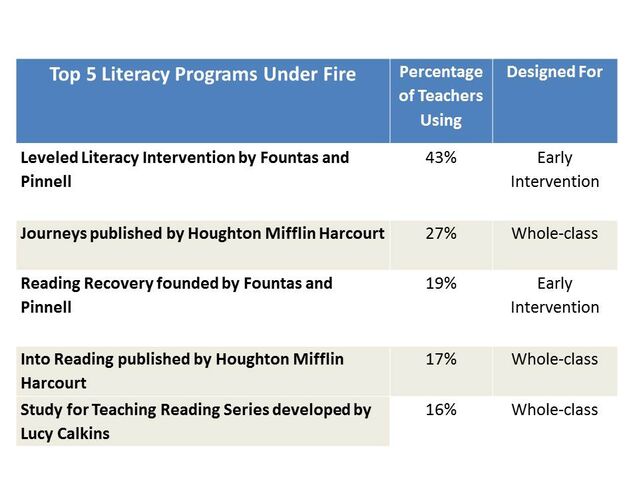Complete article
KEY POINTS
- Five popular reading programs are found to be unsupported by cognitive science.
- Foundational skills such as phonics, spelling, and handwriting are best learned from explicit instruction.
- Reading programs with minimal guidance—whole-language based, constructivist, discovery—may not be adequate for teaching foundational skills.
A debate is raging over five major reading programs in America said to be incompatible with cognitive science. The crux of the matter is that these expensive, taxpayer-funded programs all emerged out of a discredited theory of reading methodology that has dominated reading curricula and teaching practice for three decades. During this time, the U.S. has experienced declining reading scores and a growing gap in reading performance among children vulnerable to reading failure, including children of low socioeconomic status, children of color, English learners, struggling readers, and children with learning disabilities or symptoms of dyslexia. The problem has intensified with the educational challenges of the pandemic.
The reading programs under fire have in common too little explicit and systematic instruction for teaching foundational skills such as phonics, spelling, and handwriting. A grassroots movement among many educators, cognitive scientists, neuroscientists, educational psychologists, parents, and even some state legislatures seems to be gaining momentum to have the failed programs replaced or at minimum supplemented with grade-appropriate resources for explicitly and systematically teaching the requisite foundational skills. The effort moves beyond the age-old “reading wars” because it is now widely recognized to be supported by decades of research in cognitive science. The top five programs are being called out by name:
 Reading Programs Under FireSource: EdWeek Research Center (Swartz, 2019) Table by J. Richard Gentry
Reading Programs Under FireSource: EdWeek Research Center (Swartz, 2019) Table by J. Richard GentryRed-flag catchwords—often unfamiliar to parents—that characterize these programs include the following highlighted terms:
- Programs that grew out of whole language methodology, the debunked theory
- Programs that encourage students to use the three-cueing strategy for figuring out unknown words—also debunked by cognitive science
- Programs that teach kids to memorize words, skip words they can’t read, or guess words from context or pictures as opposed to reading and spelling words automatically by paying attention to letters and spelling chunks
- Exclusive use of guided reading in reading workshops
- Pulling in phonics word study in a haphazard mix known as balanced literacy but with no explicit, systematic instruction
- Exclusive use of leveled text and no use of decodable text
- Exclusive use of guided reading without explicit instruction in foundational skills
- Absence of spelling books or any grade-by-grade curriculum for teaching spelling explicitly and systematically.
- Five popular reading programs are found to be unsupported by cognitive science.
- Foundational skills such as phonics, spelling, and handwriting are best learned from explicit instruction.
- Reading programs with minimal guidance—whole-language based, constructivist, discovery—may not be adequate for teaching foundational skills.
A debate is raging over five major reading programs in America said to be incompatible with cognitive science. The crux of the matter is that these expensive, taxpayer-funded programs all emerged out of a discredited theory of reading methodology that has dominated reading curricula and teaching practice for three decades. During this time, the U.S. has experienced declining reading scores and a growing gap in reading performance among children vulnerable to reading failure, including children of low socioeconomic status, children of color, English learners, struggling readers, and children with learning disabilities or symptoms of dyslexia. The problem has intensified with the educational challenges of the pandemic.
The reading programs under fire have in common too little explicit and systematic instruction for teaching foundational skills such as phonics, spelling, and handwriting. A grassroots movement among many educators, cognitive scientists, neuroscientists, educational psychologists, parents, and even some state legislatures seems to be gaining momentum to have the failed programs replaced or at minimum supplemented with grade-appropriate resources for explicitly and systematically teaching the requisite foundational skills. The effort moves beyond the age-old “reading wars” because it is now widely recognized to be supported by decades of research in cognitive science. The top five programs are being called out by name:

Red-flag catchwords—often unfamiliar to parents—that characterize these programs include the following highlighted terms:
- Programs that grew out of whole language methodology, the debunked theory
- Programs that encourage students to use the three-cueing strategy for figuring out unknown words—also debunked by cognitive science
- Programs that teach kids to memorize words, skip words they can’t read, or guess words from context or pictures as opposed to reading and spelling words automatically by paying attention to letters and spelling chunks
- Exclusive use of guided reading in reading workshops
- Pulling in phonics word study in a haphazard mix known as balanced literacy but with no explicit, systematic instruction
- Exclusive use of leveled text and no use of decodable text
- Exclusive use of guided reading without explicit instruction in foundational skills
- Absence of spelling books or any grade-by-grade curriculum for teaching spelling explicitly and systematically.
No comments:
Post a Comment